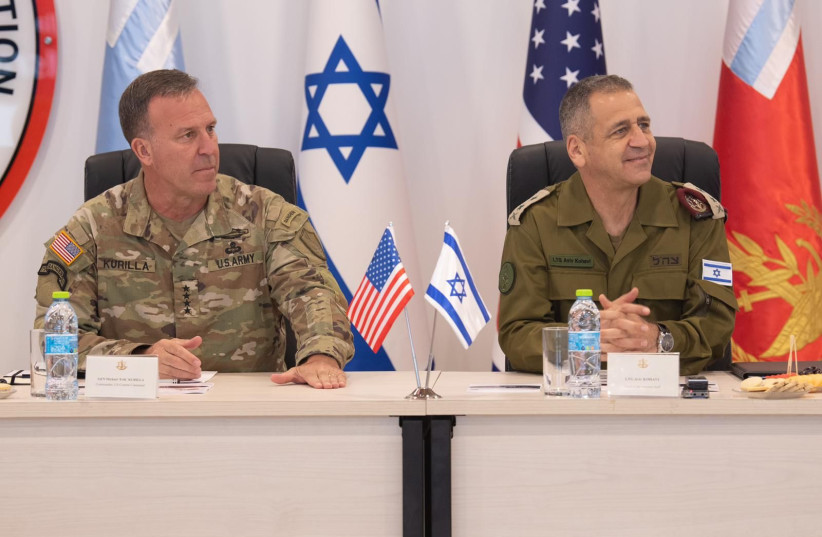Iran is increasingly concerned about Israel’s ties to US Central Command. In recent years Israel has been formally included in CENTCOM’s area of operations, whereas in the past Israel was ostensibly included under European Command.
While this is a new formality, Iran is concerned that Israel’s increased role and the Abraham Accords might give Israel a new role in the Persian Gulf. This concern has now led to increased statements by Iranian military officials and official Iranian media threatening Israel-CENTCOM ties.
The latest example is an article in Iran’s Tasnim News. The media are close to Iran’s Islamic Revolutionary Guard Corps. The report claims that Iran’s Chief of Staff Mohammed Bagheri has threatened countries in the region that “cooperate” with Israel.
The report says that “Bagheri has stated in his message that the Zionist regime’s membership in CENTCOM will make the spying (and even operational) facilities of America and its allies available to the usurping Zionist regime, and this will increase the threat to our beloved country.”
Iran claims it has raised this concern “many times” and that it is worried about what might happen next.

“On the other hand, the efforts of the Zionist regime in recent years to normalize relations with Arab countries, especially the Persian Gulf countries, and the opening of embassies in the UAE and Bahrain, as well as the escorting of American B-52 planes by Israeli F-16s over the Persian Gulf, are signs of this regime’s efforts to expand its military and political presence in the region,” Tasnim wrote.
Iran is clearly paying close attention to Israel’s role in the region in this respect. This is in part due to the fact that Iran has historically preferred empowering proxies that are close to Israel and keeping Iran’s territory far away from any frontline with Israel.
In short, Iran preferred to threaten Israel from Lebanon or Gaza and sacrifice Palestinians or Lebanese in its efforts rather than have to contend with any threats from the Persian Gulf.
The report in Iran says that having Israel in CENTCOM “means the possibility of joint official military activity with the countries in the geographical area of this regional command of the US Army.”
Iran is basically concerned that there might be joint drills between Israel and the US, as well as other US partners in the region. Although these are unnamed in the report, clearly Iran is pointing an accusing finger at Bahrain, the UAE, and potentially other neighboring countries.
Iran’s report than goes into a long history of US Central Command, noting its importance over the last decades. Iran says that following the US adding the IRGC to its list of sanctioned terrorists that Iran also classified Central Command as a “terrorist” group in retaliation.
TEHRAN HAS a clear-headed analysis of implications of Israel’s role in CENTCOM today. It notes that when Israel was under European Command there were less official meetings with Central Command. The report notes that while Israel operated in the Middle East, “practically the American forces present in this region were not responsible for supporting it [Israel] and this could cause problems for them.”
Iran remarked about the recent meetings by Central Command generals with their Israeli peers. Tehran claims that the US and Israel and Arab Gulf countries “supported terrorist groups and activated them first in Syria and then in Iraq, so that they could overthrow the regime of Syria and Iraq in these two important and strategic countries in the resistance front.”
This is a reference to Iran’s role in “resistance” in the region, a reference to Iran backing Hezbollah, Hamas, the Houthis and the Hashd al-Shaabi in Iraq. Iran claims that there is a plan “to ensure the security and geographic expansion of the Zionist regime.” Iran says that the role of its partners in Iraq, such as the Hashd, had “thwarted” Israel’s role.
Iran’s conclusion is that even though it has armed the Houthis and seen success for the regime in Syria, where Iran is entrenching, that with the expansion of Iran’s influence in the region “it can be assumed that this change in the approach of the Americans has taken place to help the Israelis more.”
The report then boasts of Iran’s new drone program and how drones can threaten the US across the region and also US partners. Iran has used drones to harass US ships, target commercial shipping, target US bases in Syria, target US forces in Iraq, and target Israel, Saudi Arabia and Bahrain.
“It is a fact that this time Iran has officially and in writing warned the countries of the region that host American bases in the region that [Iran] will react if the Israelis open their doors to their countries, shows the high level of threat to Iran.”
Iran's new doctrine: Target nations that cooperate with Israel
What Iran’s report means is that Iran is threatening to target countries in the region that are seen to be hosting Israeli forces or Israelis in some capacity.
The report says that Iran has a new “doctrine” in this regard and that it has in the past targeted Erbil in Iraq because it believed Israel was active in the Kurdistan region of Iraq. Iran says it carried out a “missile attack on the spy base of the Zionist regime. In Erbil, Iraq, there was an example of the implementation of this plan.”
Iran’s Press TV published similar comments claiming that Israeli cooperation with US Central Command will provide Israel with “spying facilities.”
Iran says it has warned countries in the region against hosting US and Israeli forces. It does not name the countries specifically. Clearly, Iran is upping the rhetoric against US Central Command and Israel and also the Gulf states as a warning. The two-year anniversary of the Abraham Accords takes place this month, and Iran is indicating its increasing concern.
